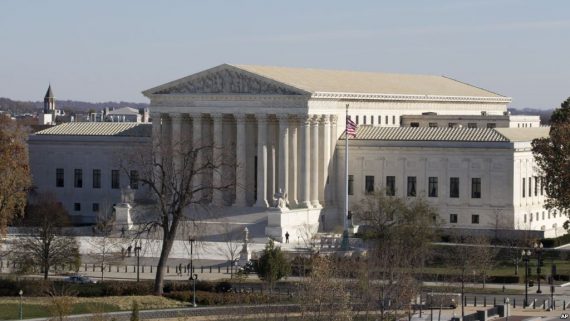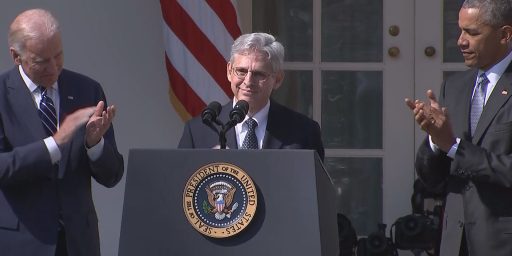Yes, We Would Benefit From A More Diverse Supreme Court
Justice Sotomayor argued last week that we ought to look somewhere other than just the Courts of Appeal, the Ivy League, and the Northeast for Supreme Court Justices. She's right.
Supreme Court Justice Sonya Sotomayor argued in a recent speech in favor of a more diverse Supreme Court:
U.S. Supreme Court Justice Sonia Sotomayor said Friday that greater diversity on the high court is important, in comments made shortly after President Barack Obama once again urged a vote on his Supreme Court nominee Merrick Garland.
“I, for one, do think there is a disadvantage from having (five) Catholics, three Jews, everyone from an Ivy League school,” Sotomayor said during a talk at Brooklyn Law School, adding that several of the justices are from New York City and none of them have a background in criminal defense law outside of white-collar crime, the Associated Press reported.
Sotomayor said varied backgrounds help justices to consider and understand issues differently, based on their experience.
“A different perspective can permit you to more fully understand the arguments that are before you and help you articulate your position in a way that everyone will understand,” she said.
Sotomayor did not mention Garland, a white man of Jewish faith who graduated from Harvard College and Harvard Law School, but some have criticized the nominee’s selection as insufficiently diverse. Obama has defended his appointment of Garland, highlighting his experience and talent.
Justice Sotomayor’s criticisms are, at least in some sense, well put and mirror statements that other Justices have made over the years about a selection process that seems to keep going back to the same sources for Justices time after time. Indeed, one need only look at a few statistics to see what Justice Sotomayor is talking about. While Justice Scalia was on the Court, there was a member of the Court who had grown up in each of New York City’s five boroughs with the exception of Staten Island. Until Justice Elana Kagan was appointed after having served as Solicitor General, every member of the Court for several years had served on one of the Circuit Courts of Appeal prior to being appointed, with four of the Justices all having come from the Circuit Court of Appeal for the District of Columbia prior to being named to the Court. Perhaps most starkly, though, is the fact that, after the departure of Justice John Paul Stevens in 2010, all of the Justices on the Supreme Court had graduated from either Harvard, Yale, Princeton or Columbia for at least law school and, in several cases, at the undergraduate as well. Judge Merrick Garland, who graduated from both Harvard University and Harvard Law School, would continue that trend. On a more superficial level, there are no veterans on the Court for the first time in a long time, although that is largely a function of the end of the draft, and every member of the Court is either Roman Catholic or Jewish.
The nation’s Court wasn’t always this way, of course, and it wasn’t very long ago that we had Justices whose experiences and background weren’t quite so limited. Many Justices throughout history had only a limited amount of experience on the bench before coming to the high court, and some came from the political world instead. Earl Warren had served as Governor of California, for example, before President Eisenhower appointed him to the Supreme Court. Sandra Day O’Connor had a background both in the Arizona legislature and as a Judge in that state prior to being picked by President Reagan. Thurgood Marshall was primarily known for being a litigator and civil rights activist before making it to the Supreme Court, although he did also serve time on the Second Circuit Court of Appeals and as Solicitor General under Lyndon Johnson. Other Justices had careers as law professors or practicing attorneys prior to their appointment. In other words, it used to be the case that Supreme Court Justices were chosen from a much wider field of candidates than Presidents seem to be looking at today, and it’s arguably the case that the Court suffers to some degree from the fact that its membership is being drawn from such a limited pool.
Jazz Shaw isn’t convinced by Sotomayor’s argument:
Those are lovely sentiments she shared during her speech, but they speak more to the tapestry of American culture. What they are supposed to have nothing to do with is justice and the rule of law. Justice is blind for a reason. Human beings, including those wearing robes and handing down decisions, are the flawed vessels who must interpret the laws, but the laws themselves must apply to everyone equally. They have to be blind to color, religion, gender, economic background and all the other factors. The rich and the poor, the powerful and the weak, are all supposed to stand before the bar at the same height. And that goes for those who must interpret those laws as well as those who face a trial.
But now we clearly live in an era where checking off the boxes for various demographic pigeonholes carries more weight than boring old ideas such as qualifications or experience. It’s not what the law says or intends, so much as how you feel about it and how it impacted your personal experience growing up. It’s a sad statement.
While I understand the concern that Justice Sotomayor’s comments that Jazz reflects, I don’t think that this is what she really meant, and it’s worth noting that the sentiments she expressed here have been echoed by other Justices in the past. On several occasions in the past, for example, Justice Scalia noted the fact that he and his fellow Justices all had very much in common, most significantly their Ivy League educations, and that the Court benefits when their are a variety of viewpoints being shared among the Justices, not the least because it forces the other Justices to address flaws in their own arguments and perhaps see the error of their ways. It strikes me that this is largely true. There are, for example, a host of fine law schools in the United States that have in all likelihood turned out plenty of highly qualified graduates that would make fine member of the Judiciary. Additionally, the Court itself would arguably benefit from the presence of someone who had practiced criminal defense law at some point in their career, especially when dealing with issues that arise under the Fourth, Fifth, Sixth, or Seventh Amendments. Picking a Justice from somewhere other than the Northeast or West Coast would also seem like something that might be beneficial, as would picking someone from somewhere other than the Federal Judiciary. As I noted above, there was a time when it was quite common for Supreme Court Justices to have much more diverse backgrounds than they do today, perhaps it’s time we gave that a try again.






The problem is that there are immense political pressures to choose *predictable* judges with no controversial opinions. That´s why some of the best jurists on the Right(Like Alex Kozinski or Richard Posner) never had much of a chance of being nominated, and that´s why Bill Clinton did not manage to nominate a governor to the Court.
Basically, any political junkie has a list of names of jurists that they would like to be nominated to the SCOTUS. Activists on the right and on the left have lists of people that they want to see nominated, and Circuit Justices or Attourneys General are the only kind of predictable nominee.
It’s a pipe dream now, no chance of that ever happening again, look at what happened with Jane Kelly. She was only rumored to be on the list for possible nominees, and right-wing groups went crazy with Willie Horton-like ads demonizing her for all of the things her defendant clients allegedly did. Conservatives as a group will not allow a defense attorney on the bench ever again. Because all defendants are guilty and they don’t deserve a defense either. They just want to hang them directly after booking.
As I understand, there’s another aspect that all the justices share… they’re all former prosecutors with little experience being the defense attorney. I suppose that being a judge gives some insight to the other side, but it’s not the same as playing defense when that’s your only option.
Over at his place, Booman had a good post pointing out, correctly I think, that Chuck Grassley’s much maligned comments on Robert’s remarks are in fact true. Roberts said the confirmation process is too politicized. Grassley responded that it’s Roberts’ fault because the Court itself is too politicized. Booman says Grassley’s right. It’s hardly all Roberts’ fault, but the Court is indeed politicized.
Booman believes this goes back to Brown v Board of Education where the Court delivered something that was necessary, that the country was ready for, that had support of a large majority, yet conservatives were able to block in Congress and state legislatures.
Why are there five Catholics (along with three Jews) on the Court in a majority Protestant nation? Because Conservatives won’t accept abortion. Why are they all Ivy League, federal appeals veterans? Because a president has a better chance of getting a highly credentialed appointee through the very political process. Why does Grassley pretty much say, and Jazz Shaw imply, that the only correct approach is strict construction? Because it’s the only way for the Court to hold back the 21st Century.
I find it interesting that Jazz can say:
without even noting that they are not. Or say,
without even noting that they are not. Or say,
without even noting that they are not. Or say,
without it even occuring to him that maybe, just maybe, one has something to do with the other?
Because Justice in this country, is NOT blind. Not in any way shape or form. But it’s a lovely sentiment he shared in that little commentary, but It speaks far more to his own willful blindness than it ever will to the reality that is American culture
@gVOR08:
It would seem that conservatives have never heard of McCulloch v. Maryland, i.e. that enumerated powers do not prevent the Congress from doing more than what is specified in Article 1 Section 8.
Then again, I’m not sure why they would care; the case is only 196 years old.
And it all goes downhill from there. It’s astounding that antebellum nostalgia remains a political movement.
I think Jazz Shaw is putting forward an argument for diversity, even though he doesn’t realize it.
@OzarkHillbilly:
Conservatism has devolved into a bizarro movement that combines the need for an alternate reality with utopianism. They need their own “facts” so badly that they have to also have their own media to reinforce the orthodoxy.
@Ben:
To be fair, though, this is because conservatives are strict constructionist who revere the Constitution, and as we know that document says defendants are presumed guilty and don’t deserve due process….
@gVOR08 :
I would add to this: five Catholics because running the “right sort” of Protestant is extremely problematic with the general public in a way Catholic is strangely not. Are they acceptably evangelical / pious / Dominionist / not “cultish” (7th Day, LDS, etc) to the uber religious right? There’s a laundry list that “Jesus men” look for and a judge has to actively downplay a majority of those to do their job. Few lawmakers will be unmolested for letting a firebreathing, LGBT-denouncing, women-as-helpmeet-only, life-at-conception fanatic in but stereotypically expect a Catholic to espouse (and therefore push for) those same beliefs without censure. It’s one of the reasons Pope Francis is riling up so many; if he changes the dogma and social expectations, then you can’t reliably say “Well, that’s just how the Catholics are! Oh well, sucks to be you!”
Warren earned his JD from Berkeley, O’Connor earned an LLB from Stanford.
Just to be clear – are we arguing for more diversity, or are we arguing that Tier III law schools are underrepresented?
@HarvardLaw92: I think that both. 😉
@gVOR08:
The thing is, I don’t see how the Court could not be politicized unless they simply refused to stop hearing cases. Many of the cases before the Supreme Court are divisive. And most people’s definition of “politicized” is “a decision I disagree with” So liberals thought Obergfell was a sound decision while conservatives thought it was politicized. Conservatives thought Hobby Lobby was a sound decision while liberals thought it was politicized. Basically, if any justice disagrees with your opinion, they’re playing politics.
If you read the decisions, the Court tries very hard to stay out of the politics. They issue a lot of unanimous or near-unanimous decisions that don’t get talked about very much. But there are always going to be a few cases each year where the politics are fraught, the court is divided and, no matter what they do, someone’s going to be mad.
No, I think Roberts is right. The Court has always made tough “politicized” decisions. The Warren Court, in particular, drew a lot of fire for its decisions. What’s changed is that we now see SCOTUS appointments in terms of how they will affect those decisions, rather than the qualifications of the people nominated.
Sounds to me like Doug is asking for, and Jazz Shaw is decrying, an “affirmative action” plan for non-Ivy League, non-coastal dwelling, non-federal appellate court Supreme Court candidates. Why, it’s almost like a purely credentialist approach won’t yield a diverse, or even the best functioning, organization.
I wonder if this applies to organizations other than the Supreme Court? Hmmm…
At this point, I’ll just be happy to get an extra Jew to help balance the Catholics. 😉
@bookdragon: I hope a Muslim gets nominated. The complete meltdown on the right would be so much fun to watch.
When holding a meeting on an important project, I always want the best in the room. Half the time, the best is not who HR thinks based off the pretty little lie showcase we call resumes. I don’t give a flying crap about where your degree is from unless there’s a specific reason (you snagged a full-ride scholarship, you were part of a rare program, etc) to care about it. It’s part of a larger picture that includes your background, your ethnicity, your spirituality, your life. Your past informs your present and your future in subtle but powerful ways. Some of my most ingenious coders and engineers came from poverty and adversity, making them think outside the box and notice issues that flew right by everybody else. The in-house coder with the most awards was mostly self-taught and has a community college degree; the laughter stops pretty fast when the new hires realize how out-classed they are.
I want the best in the Supreme Court. The decisions they make are far more vital then my Mon 8AM. If that means we go hunting outside our usual talent pools, that can only be a good thing.
@OzarkHillbilly: Sharia Law!
BTW, my apologies for a simple analysis of Jazz Shaw which you handled much more ably a couple comments above mine. I didn’t actually see your comment beforehand (only 3 minutes difference between us, probably what it took me to read the original post).
@OzarkHillbilly: That would be awesome! But we need a Dem senate, so maybe next year.
You know, there is an excellent Supreme Court candidate that will become available around time of Clinton’s inauguration. Not only is he sufficiently well credentialed, but he is from the Midwest, is not a federal appellate court judge, and has a diversity of relevant experience that would be a great asset to the Court.Maybe Hillary should consider him…
@stonetools: Yeah, but he went to Harvard Law. Oh well…
@stonetools:
No,I’m not asking for “affirmative action.” I’m saying we should break the current pattern when it comes to Supreme Court appointments and Presidents should be more open to looking to places other than the Circuit Courts of Appeal for potential Justices. There is a long list of former Justices, including many who are now considered to have been among the Court’s finest, who did not attend an Ivy League law school and had career experience at somewhere other than the Federal appeals level before being appointed.
@stonetools:
And he’s a Protestant!
@Doug Mataconis:
An outright disclaimer of asking for affirmative action, followed by:
Asking for affirmative action.
@stonetools: Yeah, but @KM: wants his best team around. Here in very conservative Cincinnati, that would cost me half my team to exploded heads.
On the other hand, he did say he wanted to hang around DC till his youngest is out of HS. And I love the thought of him coaxing Clarence Thomas into a SCOTUS Black Caucus.
@Rafer Janders:
Only in your mind is what I suggest — a return to an historic norm that existed before the late 1980s — a call for “affirmative action.”
@Doug Mataconis:
In the current environment, yes. You are, rightfully, calling for more diversity in the ‘hiring’ process at the expense of currently accepted achievement markers, that is rather what affirmative action does.
I’m surprised nobody has even mentioned what I consider to be the most glaring lack of diversity on the Court:
Nobody who knows what a neutrino is.
Nobody who has ever played a MMORP game.
Nobody who routinely texts, tweets, or snapchats.
Nobody who thinks religion is a mental illness.
Nobody who has ever clipped coupons, bought bulk at Costco, or eaten creamed chipped beef on toast.
Nobody who understands the difference between Bayesian and Frequentist statistics.
Nobody who has read both The Da Vinci Code and The Bridges of Madison County.
Nobody who has lived in a trailer, public housing project, enlisted barracks, or shelter.
Nobody who has eaten a deep-fried Twinkie.
Nobody who has had a week of tinnitus and laryngitis after attending a Whitesnake concert.
Nobody who knows the difference between inertial mass and gravitational mass.
The list goes on. Taken together, that’s an overwhelming swath of both common life experiences and things the educated should know that are missing from the Court. They make rulings that depend on understanding how people really live — yet they don’t. They make rulings that depend crucially on statistical and scientific arguments, and are not competent to understand those arguments.
@Rafer Janders: Judge Mathis !
@DrDaveT: Agreed – but then you’re arguing for roughly 901 justices in the Supreme Court if we are to cover even just the major categories into which 300 million Americans fall.
OK, what are the benefits of a more diverse court? Are there any specific decisions that would have gone the other way if there were a nonHarvard justice, and please explain how America would have been better. I understand the abstract point but am not good at abstract thinking.
@Doug Mataconis: I agree with the principle for which you are arguing. On the other hand and in the current environment, where are you going to find advisors for Presidents who are going to know where to look for the kinds of people you describe with the credentials to pass the array of litmus tests that Congress will subject the candidates to?
Remember that Earl Warren–to mention the most obvious example–was part of a backroom deal that gave the GOP Eisenhower as the candidate in 1952 (and not as a condition from Ike’s side of the room but as a cost to get party leaders to back him). Eisenhower is said to have always regretted making that deal.
I’d like to see a return to nominating justices who are chosen simply because the President and his people think the person nominated is wise enough to handle the job. Sadly, that boat sailed when we needed to start defending/repealing Roe v Wade, among others.
@DrDaveT: I’m sure that Sonia Sotomayor has at least a few of those experiences.
Let’s see . . .
“Harvard” = University
“Yale” = University
So “Harvard + Yale” = Diversity.
It’s just logic.
@HarvardLaw92:
Are you suggesting there’s nothing between Top 10 and Tier III?
@R. Dave:
Exactly the opposite.
How about we nominate and confirm excellent, extremely well-qualified
people to the Supreme Court?
There are plenty of judges and legal experts who graduate from non-Harvard and non-Yale law schools in this country – Berkeley, Stanford, Michigan, Virginia, Chicago, NYU, Northwestern, Georgetown, just to name a few..
@Doug Mataconis:
I think you are responding to the conservative caricature of AA as a “racial quota” system. AA is really adopting a policy designed to increase the employment opportunities of disfavored groups-in this case, Supreme Court candidates that aren’t part of the coastal, Ivy League, federal appellate court pipeline. Indeed, switching from the current policy to the “historical ” policy would itself be “affirmative action” as it would mean a change in selection policy toward heavily favoring criteria other than Ivy League and federal appellate court credentials and considering other professional experience and geographical diversity as part of the selection criteria. This is BTW exactly the kind of thing that goes into formulating affirmative action policies in college admissions.
But hey, I understand why someone from the right side of the spectrum wants to avoid the affirmative action label.
BTW, the “historical norm” included a lot of political chicanery and horse trading in selecting Supreme Court appointments as well, including an informal quota on Jews, so going back to “historical norms” isn’t quite the ideal you make it out to be.
@DrDaveT: I’d settle for just a couple more justices who understand how 1) the female reproductive system works and 2) the use of contraceptives in providing health care to women outside of birth control.
@Blue Galangal:
Menstrual cycle comes in, menstrual cycle goes out. You can’t explain that.
Not a requirement for the bench but I highly recommend the movie Fargo to any prospective Jurist.
They might learn something about women in law enforcement.
“yah”
@Slugger:
I think a few decisions would have gone the other way if there had been on the court someone who had actually represented a criminal defendant at any level. Also if someone who represented a plaintiff in a tort case against an insurance company. Or someone who had filed a police brutality lawsuit. And so on.
The law school credentials are IMO less important, but I believe that there are good candidates out there who never went to Harvard , Yale, or Stanford.
@Monala:
We should start a pool on which ones. 🙂
@DrDaveT: I hit most of those wickets!
@stonetools: Obama would actually make an excellent Justice. Indeed, a better Justice than he was a president, in that the job is more directly suited to his talents and training. (And because being president is wickedly more difficult.)
@gVOR08 @stonetools:
Eh, a job listings more like a wish list anyways. I’d take Obama for Justice in a heartbeat. He even ticks off some of DrDaveT’s list and adds ones like “Has firsthand experience with a foreign culture” (important as a large percentage of Americans were born abroad).
Go for it, Hillary! The hearings will be a hoot.
So he would be the greatest supreme court justice of my lifetime, is what you’re saying.